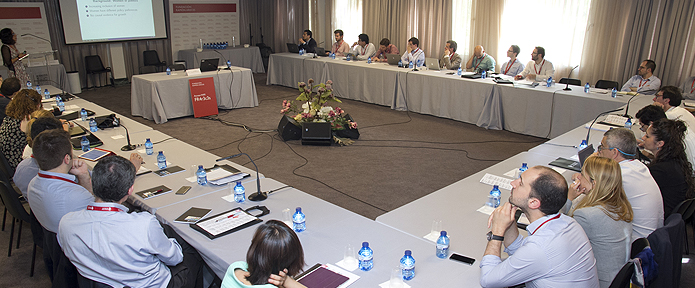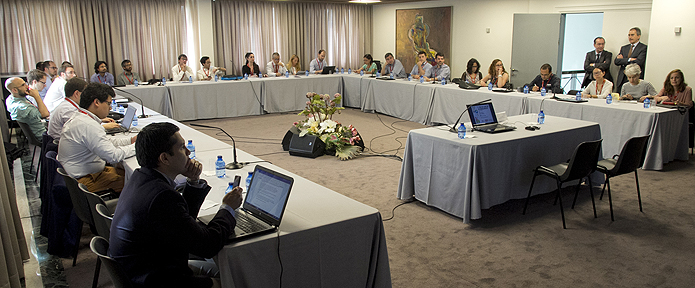"The policies of development should not neglect agriculture, given the scope of productivity and the importance of this sector for employment"
lecture Chris Papageorgiou, from the IMF, gave a presentation on improving exports at framework of a meeting organized by the Navarra Center for International Development and the Ramón Areces Foundation.

Chris Papageorgiou, from the International Monetary Fund, participated in the V NCID Research Workshop, organized by the Navarra Center for International Development of the University of Navarra and the Fundación Ramón Areces on June 6 and 7 in Madrid.
He gave a lecture entitled 'Export Enhancement, a core topic for development? ', in which he presented a study that develops new export quality estimates, covering 178 countries and hundreds of export products over the period 1962-2010.
Chris Papageorgiou is head of attachment in the Income Unit leave of the International Monetary Fund's department Strategy, Policy and assessment . Since joining the IMF in 2006, he has worked in Uganda, Tanzania and the US, and has developed work on a wide range of topics related to income countries leave. His analytical work focuses mainly on economic growth and international macroeconomics. He has published numerous articles and is an associate publisher of the scientific journals European Economic Review and IMF Economic Review.
How is quality improvement defined and how can it be implemented in each country?
Increases in per capita income are often accompanied by a transformation in a country's production and export structure. This may include diversification into new products and trading partners, as well as an increase in the quality of existing products. Simply put, quality upgrading occurs when the quality of existing products increases, which is measured by the adjusted price of these products - generally, the higher their prices, the higher their quality.
From agreement with the research you have presented, institutional quality, liberal trade policies and human capital affect product quality. Is there an effective way to integrate all these variables successfully?
In any development strategy there is no single solution; each country has to prioritize according to its individual status . Depending on where a country is on the development pathway there are different priorities in terms of quality improvement. Our results show, however, that this growth engine has to serve not only emerging markets with industrial capacity and developed manufacturing sectors, but also poorer countries that are lagging behind in the agricultural sector. But even between two low-income countries, the strategy may be very different. Tanzania may need to focus on quality improvements in niche markets such as organic coffee and cashew nuts, and Vietnam on high-end manufacturing average. What we offer is a set of tools for countries to assess and act on according to their own situations.
What are the implications of this research in terms of design of policies?
The answer necessarily depends on whether there are market failures that hinder entrance in new lines of economic activity and to what extent they are country- or product-specific. Particularly in low-income countries, market failures abound in the provision of infrastructure, the accumulation of human capital, the establishment of business networks and the functioning of factor markets, and the creation and management of ideas. Evidence from country analysis and case studies programs of study sample that "horizontal" policies, such as improving Education, infrastructure and the institutional and regulatory environment, improving access to new export markets, and structural reforms (e.g., trade liberalization, reduction of agricultural production subsidies and price controls, financial development through banking sector reforms) have proven successful in facilitating diversification, a renewal of resources in activities, and quality improvement.
How industry-focused and narrowly targeted measures have helped sustain efforts remains an open question; broader types of policies aimed at addressing specific market failures (e.g., those that facilitate industrial clustering and provide information for export-oriented infant industries; Harrison and Rodriguez-Clare, 2009) have played a role in promoting the entrance of new economic activities in countries at development. At internship, the heterogeneity of country experiences and constraints requires a flexible, country-specific approach of policies.
What role does agriculture play in this research?
Opportunities for quality improvement are strongest in industry, but also exist in agriculture. Policies at development should not neglect agriculture, given the scope for significant productivity and quality gains within this sector and the importance of agriculture as source of employment. For many low-income countries, a large share of the population works in agriculture-usually the least productive sector-and rapid diversification into industry will continue to be a challenge. Therefore, for the economic benefits of diversification to reach the poorest group , the agricultural development should have a more central role.
There are potentially substantial gains in productivity and quality potential in the transformation of the agricultural sector through the promotion of high-value agricultural products, entrance of new products, and quality improvement (e.g., through promoting the transition from subsistence farming to production for the market). In particular, the potential for quality improvement is not limited to manufacturing: as countries develop, the quality of manufacturing and agricultural products increases substantially, with scales of quality varying considerably between products in both sectors.
How can countries develop a balance between micro and macro policies in their economic development plan?
Balanced action is needed. Macro policies must be the light that guide the micro level policies; otherwise there will be confusion and disorganization with significant inefficiencies in the process. That is why our work suggests that countries need to think about a viable development strategy that can be the anchor for all the micro policies that can support it. Once you have a development strategy, say for the next 5 years, all that is left is good implementation and hard work . Without a plan, especially in economies at development, life can be chaotic, confusing and very unproductive.




